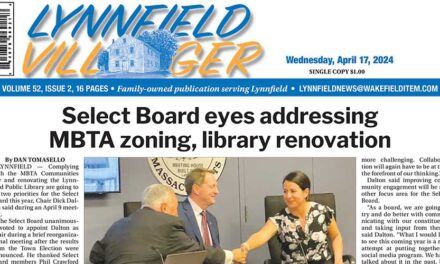Published in the March 23, 2016 edition
By MAUREEN DOHERTY
LYNNFIELD — The town has a potential private buyer interested in purchasing Centre Farm and preserving it as a residential home for his family.
The announcement was made at Monday night’s selectmen’s meeting during an otherwise routine budget meeting, which included an update from the Capital Facilities Advisory Committee (CFAC). Centre Farm falls under CFAC’s purview because the building is owned by the town.
Centre Farm was bought for $1.4M following a 534-27 vote at a special Town Meeting in June of 2014 to enable the town to put deed restrictions in place that would prevent the land from being subdivided and to preserve the historical integrity of the building. The town set a two-year timeline to develop the deed restrictions and to find a buyer for the property.
On Monday night, the selectmen were due to offer their recommendations on the town’s FY ’17 operating and capital budgets put forth by Town Administrator Jim Boudreau as well as weigh in on many of the 32 warrant articles to be presented to the voters at Town Meeting on April 25 when representatives of the potential buyer were introduced by CFAC Chairman Ted Caswell.
The potential buyer is Steve Migliero, a Lynnfield resident who grew up in town and was represented by local attorney Tim Doyle of Colonna & Doyle and Mathew Cummings, principal of Cummings Architects of Ipswich, a firm that specializes in the rehabilitation of historic properties.
Doyle and Cummings said their client is interested in maintaining the historical architecture and streetscape of the early 18th century farmhouse that has defined Lynnfield center for generations. Doyle said they have done their “due diligence” in assessing the property and together with the team put together by his client they feel “very confident” they’ll be able to preserve the building’s “historical, architectural and cultural significance.”
Cummings said exterior alterations would include correcting historically inaccurate features visible from the street, such as a few windows and doors, and painting the home in historically accurate colors.
Alterations to the living space that could not be seen from the street would include the addition of French doors in the rear, for example, he said. Cummings presented a draft sketch of proposed alterations to the selectmen.
Cummings said his client is “enamored about living in a house with very bad heat and little water.”
Selectmen Chairman Phil Crawford said the buyer must certainly be aware of the historic preservation restrictions on the property. The “big question,” Crawford said, is whether he “is willing to purchase the house with the restrictions in place now.”
Doyle said they are willing to purchase the house with restrictions; however, upon reviewing the restrictions with Cummings they found some to be “pretty burdensome,” adding, “the current draft will probably not work for us.”
Doyle likened restrictions pertaining to interior living spaces as the “difference between a historical restriction for Abe Lincoln’s house and a historical restriction for the Centre Farm. If you look at the restrictions that are currently drafted, they’re more toward preserving Abraham Lincoln’s house.”
While preserving the exterior facade is not a problem, adhering to language that hinders “a homeowner’s ability to operate the home as their own home” would be difficult, Doyle said.
“We would look to limit the scope of the preservation agreement that is currently proposed but certainly we would respect the spirit of that restriction,” Doyle said.
Crawford said he considered the changes presented to them by Cummings as “improvements to the facade” and he did not have any issues with it.
Selectman Chris Barrett favored selling the property, noting that getting the site in hands of a private owner who would maintain was exactly what he had “hoped would happen” when he voted in favor of the purchase at Town Meeting.
Barrett asked Cummings if he had done any work locally that they could review. Cummings said he recently renovated a white farmhouse with a red barn on Main Street for another client.
Cummings said they work exclusively with private owners of private historic homes. They document the condition of every feature of the home, down to the doorknobs and hinges, to determine if they are historically accurate. Their ultimate test is to imagine if the original homeowner were to visit the home would he feel it was as it should be.
Selectman Tom Terranova asked whether the removal of some deed restrictions affecting the interior of the home would affect the asking price.
Doyle said removal of those deed restrictions would not add any value to the asking price, but leaving them in place would have “the affect of chilling the transaction from going forward.”
On this year’s warrant, Article 21 seeks to see if the town will vote to transfer the property at 567 Main St. to the Board of Selectmen for the purpose of selling it or leasing it on behalf of the town.
Boudreau recommended that the board dispose of the property. He said it was assessed at $840,000 last year and he believes that price will still constitute the minimum bid to be accepted by the town if this warrant article moves forward.
Boudreau explained that if the town were to retain ownership of the site and lease it, such as utilizing the large barn for functions, the town would remain responsible for bringing the property up to code, including lead paint removal on all surfaces five feet and below. This would include all chair rails, windows and painted woodwork throughout the house, he said. By contrast, private homeowners need only “encapsulate” lead painted surfaces to comply with the law, he said.
That expense, in the several hundred thousand dollar range, would be in addition to the necessary upgrades to the plumbing, electrical, septic and ADA compliance for accessibility, which would likely result in removal of cobblestone driveway, for instance, he said.
Boudreau said the difference between the price the town receives if it was sold and the purchase price of $1.4M should be considered an investment by the town to ensure that the property was not subdivided, which the voters had viewed as negatively affecting the overall character of the town center and the value of the homes in town.
Later in the meeting, the board members ultimately voted 3-0 to recommend approval of Article 21 to transfer Centre Farm to the board’s custody for its sale or lease.




